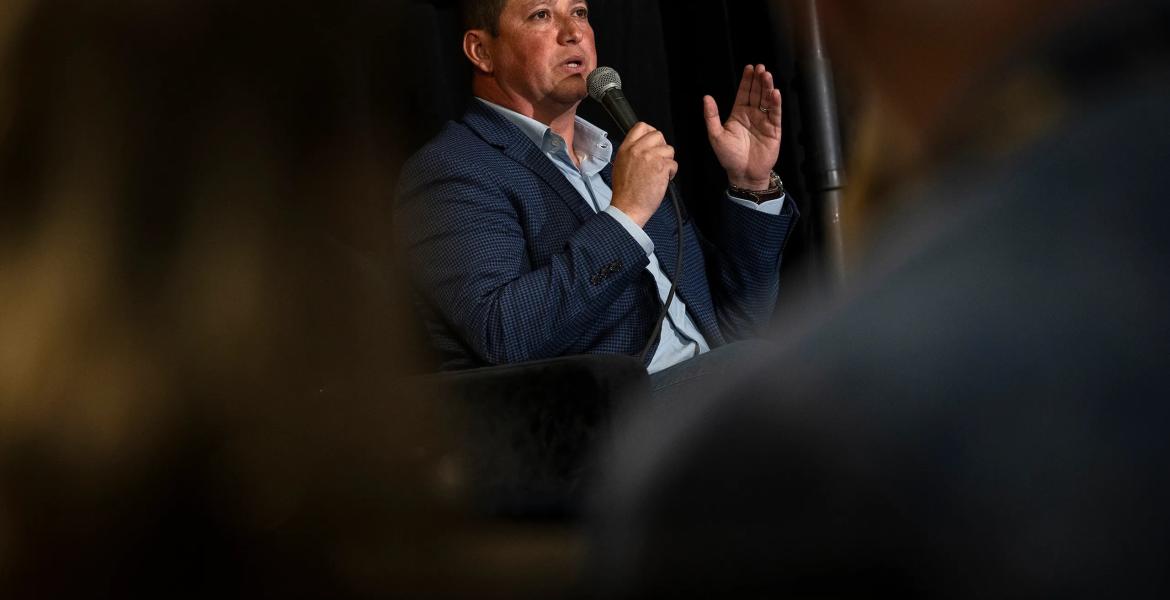SAN ANGELO, TX — The Lt. Governor of Texas Dan Patrick isn’t taking care of Texas property taxpayers, and the Democrat who is opposing Patrick in November wants you to know why and how to fix it. “Everywhere I go, people are mad about rising property valuations, and the higher property tax they pay because of it,” he said in an exclusive interview with San Angelo LIVE!
The Democrat challenging the incumbent Tea Party Republican Lieutenant Governor is Mike Collier. He is from Houston where he rose to the position of partner with PriceWaterhouseCoopers, a giant accounting firm. Collier was an auditor there. In auditing the books of large corporations, Collier learned how to sniff out financial shenanigans. And that’s what he said he did to the budget of the State of Texas during his unsuccessful run for State Comptroller in 2014. Republican Glenn Hager defeated him soundly then.
That race for Comptroller wasn’t a total defeat for Collier. It forced him to review issues pertaining to how the State raises revenues, particularly its property taxes.
It was personal for Collier, too.
Property taxes fund our public schools, and Collier said when he was a private citizen, he noticed that year after year, even while his property tax he paid on his home was increasing rapidly, the school district was always out of money. He put his CPA hat on and researched why. That’s when he found the loophole that he said benefits corporate fat cats and hurts the smaller property taxpayers across the state.
Collier found that very large real estate owners were getting a huge tax break, shifting the property tax burden onto residential and small business property owners who can least afford it. What is more, he asks, how many of the large companies and trusts that own the tallest skyscrapers in Dallas, Fort Worth, Houston, Austin, or San Antonio aren’t based in Texas, and don’t necessarily spend their profits in Texas?
Why are large commercial and industrial property owners getting away with it? Collier likes to say it is because Dan Patrick won’t do anything about closing a loophole found in a 1998 Texas Statute called the “Equal and Uniform” provision.
“The law is supposed to protect the property owner from an overzealous appraisal district appraiser,” Collier said. “But it’s not.”
Because of a loophole, corporate tax attorneys have exploited the State for 20 years. The loophole is in the “Equal and Uniform” provision. It means holders of very large real estate holdings in Texas, particularly skyscrapers, and large commercial and industrial tracts, can appeal their appraisals successfully through district courts, the appeals courts and even the Texas Supreme Court to wipe out large percentages of their property’s valuations. Smaller property owners can’t afford the attorneys or have time for a similar fight.
When large commercial and industrial property owners are paying less taxes than they should be, that places more of the burden to the individual homeowners and small business owners— the guys who cannot afford expensive legal bills to fight appraisals—to fund our public schools.
Collier claims that since Patrick was sworn in, gross property tax payments by the property owners—particularly residential and small business commercial/industrial property owners—have increased from 4 percent a year like it was under Lt. Gov. David Dewhurst, Patrick's vanquished opponent in the 2014 election cycle, to 6 percent a year under Patrick.
In 2006, Collier said, a study indicated that from the largest appraisal districts in Texas, the State was losing $4 billion per year in tax revenue because of the loophole. Adjusted for inflation, he said today, that figure is closer to $5 billion annually.
That $5 billion a year is enough to fix the current crisis in public school finance, he maintains.
How does the loophole work? One of the first lawsuits filed to exploit the loophole was by the Real Estate Investment Trust (REIT) that purchased Mason Park Centre in west Houston in 1998 for $15.2 million. The Harris County Appraisal District provided the new owners a reasonable appraisal of $13.9 million. The Mason Park Centre owners protested, and when the local CAD didn’t acquiesce, it took the county appraiser to district court. There it found a sympathetic ear where the judge ruled that the Uniform and Equal clause was applied inappropriately because the CAD considered the market value of the Centre itself, when it should not have under the ambiguous State law. The Texas Supreme Court agreed, and Mason Park Centre’s value was reduced to $10.3 million, nearly $5 million less than the purchase price. To add insult to injury, the court ruled that the Harris CAD –effectively the taxpayers—had to reimburse the REIT for its attorney’s fees.
The case opened up the floodgates. County.org notes a Houston corporate tax attorney bragged on his website following the court ruling that, “Appealing based on unequal appraisal is beneficial because it allows an owner to reduce the taxes even if the property is assessed for much less than the market value.” In Mason Park Centre’s case, the original appraisal was $1.3 million under the market value as revealed in the purchase price, a good, and many will agree, fair appraisal. Yet the corporation was able to whack its appraisal further down, to $4.9 million below market value, by exploiting ambiguous wording in Texas law. This ambiguity allows the courts to agree that market value of the appraised property can’t be considered in making CAD appraisals. For more on Equal and Uniform see County.org.
In other cases, Collier said, the loophole allows an owner of a skyscraper to shop for a comparable property in another city located in another state to protest their CAD appraisal down 10s of millions of dollars. For example, Whole Foods can protest the value of its store in swanky Uptown Dallas by comparing its value to a Whole Foods location in downtrodden Detroit. Comparable properties don’t have to be in the same city, county, or even state where the appraisal is made, the loophole allows.
“The law isn’t worded properly. It allows big corporations to go to town suing in district courts and getting judges to agree to lowering the property values on properties owned by entities that can afford attorneys,” Collier said.
That loophole is one reason school finance isn’t working today, Collier said. Of the 100 largest school districts in Texas, of which the San Angelo ISD is one, spending per student is down $600, but taxes paid by local property owners is up $700 per student, from 2010 until 2017. One of the reasons why has to do with the sunset of the Additional State Aid for Tax Reduction (ASATR), but much can be fixed by closing a loophole that makes property-rich school districts poorer than they really are, Collier maintains.
“The lieutenant governor can get any piece of legislation on the floor for a vote,” Collier said. The fix for Equal and Uniform is proposed in committee every session but has never made it to the floor of the Texas Senate under Dan Patrick,” he said.
Why is that? Collier said because REITs and corporate property owners can afford lobbyists. In one case, Collier said a lobbyist paid a lawmaker $140,000 in campaign contributions to table the bill that would have closed the loophole.
Collier said if elected, during his first term if he does nothing else but close this loophole, he will have a successful term as Lieutenant Governor. What’s hanging out on the other side, he said, was $5 billion a year in additional revenue for the legislature to spend on public schools or give back to the taxpayers.
He’s a Democrat, but he said he’d want to give the smaller property tax payers—the homeowners and small businesses—a break. He may be sincere. He said before he jumped into politics and learned about issues like this, he voted Republican.
Subscribe to the LIVE! Daily
Required






Comments
Listed By: David Blumentritt
I don't see a fix here, just calling for more tax revenue from closing loop holes. Why can't we get a constitutional amendment to vote for a measure that all changes in property tax values whether they go up or down have to be revenue neutral. Right now when appraisals go up the taxing authorities just go along with the ride and the increase is automatic. I have no recourse as a property tax owner other than to argue my property is not worth what they say it is. There's no accountability on the taxing authorites where it should be. If they want more revenue they should be accountable for raising the tax rate.
- Log in or register to post comments
PermalinkPost a comment to this article here: